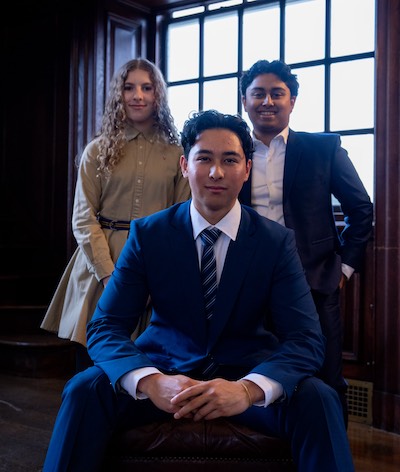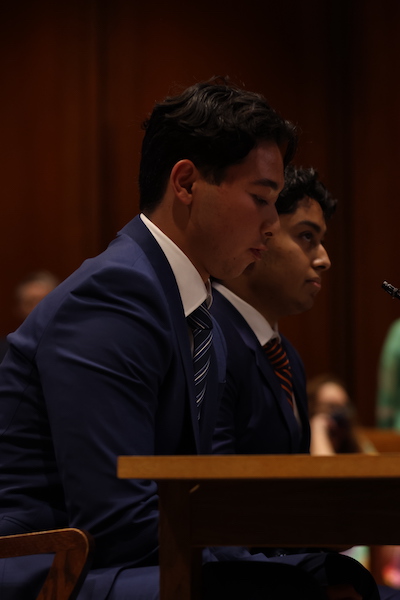 “The future” can mean different things to teens: It could describe next weekend, or spring break, or college, or even a potential career path.
“The future” can mean different things to teens: It could describe next weekend, or spring break, or college, or even a potential career path.
One group of Milton students takes a decidedly long view that includes making sure that they (and others) are prepared financially for all the possibilities—college and housing costs, budgeting, building credit, saving, investing, retirement, and financial stability for their families.
And planning for this future? The sooner you start, the better. The students’ passion for helping their peers and other young people achieve financial literacy has taken them from Milton to the Apple App Store and even the Massachusetts State House.
To help young people learn financial literacy and investment principles, Hugo Eechaute ’24 created StockSense. The free app, aimed at users ages 15 to 21, teaches the basics through fun, easily accessible games. He’s gotten the app off the ground with the help of some Milton peers, including Simon Farruqui ’25, the COO of StockSense, and Isabella Alba ’26, its CFO. The app, which is available on Apple’s App Store and will soon be available to android users, is similar to popular learning programs like Duolingo, with short, fun lessons and achievement badges.
A boarding student from Singapore, Hugo has traveled extensively and was struck by how many young people he’s seen living in poverty. His father, who struggled before achieving business success as an adult, gave Hugo a solid foundation in financial literacy. It’s information that could benefit anyone, no matter their financial position when they start off, Hugo said.
“Why is it that only the wealthy and privileged have the opportunity to learn financial literacy? Why isn’t this information accessible to people of all socioeconomic backgrounds?” Hugo asked himself. “Because of my interest in finance and what I’ve seen around the world, I wanted to do something about it.”
His opportunity came three days into the summer of 2023, when he tore his meniscus. Recuperating at home after a surgery, Hugo started to work on developing StockSense. When he returned to Milton in the fall, he recruited a few friends to help and StockSense was launched.
Recently, Hugo and Simon took their passion for financial education to the Massachusetts Legislature, testifying in support of a bill that would make financial literacy instruction a graduation requirement in the state’s high schools. Simon found out about the bill while researching opportunities to advocate for young people to learn about managing money as part of a project for his American Government course. Simon and Hugo joined several representatives from public schools across Massachusetts to support the bill at a hearing earlier in January. Both their appearance before the legislature and their new app have garnered quite a bit of media attention in the Boston area.
“Why do we want kids to start so early? Financial literacy is a technical skill that you develop over time, so the awareness is really valuable,” Simon said.
Massachusetts—where public elementary and secondary schools are consistently ranked top in the nation—received an “F” grade for its financial literacy education from the Center for Financial Literacy in 2023, prompting State Representative Ryan Hamilton to file a bill to make financial literacy instruction a high-school graduation requirement. 
Milton gives students several opportunities to learn about finance and economics, whether through economics courses or several busy student clubs focused on investments, microfinance, Invest in Girls—a program founded at Milton to encourage girls to pursue business careers, of which Isabella is a board member—entrepreneurship, and economics. Both Hugo and Isabella are leaders in the investment club; students are also working to revive The Centre Street Journal, a financial publication. Simon, a boarding student from New York, also found inspiration in his family story; his father grew up in Bangladesh and education was key to lifting him out of poverty. Freshman year, at the encouragement of an older housemate, Simon joined the Milton economics club, which went on to place fourth in Massachusetts in the National Economics Challenge.
“That was one of the critical turning points where I was able to go deeper into my interests,” he said. “This past summer, I participated in LaunchX, which is a program for aspiring entrepreneurs with business ideas.” Simon also enrolled in Harvard summer programs in game theory and the neuroscience of financial decision making. Through his Milton courses, books, and other classes off-campus, he’s built an understanding of the differences between the social science of economics and the practical skills needed to responsibly manage money. During his State House testimony, Simon urged lawmakers to consider those differences and require a separate financial literacy program in schools.
Prudence can be a tough sell for young people, Hugo and Simon said, so they base their advice on time-tested practices, like investing in mutual funds and steering clear of dubious opportunities promising too-good-to-be-true returns. It can be hard to drown out the noise surrounding money trends like cryptocurrency, the 2020 frenzy around GameStop’s stock, and sports betting, which underscores the need for stronger financial education.
“If you don’t know what you’re doing, you’re vulnerable to gambling your money away,” Hugo said. “We want people to understand that what they see on TV is not what happens all the time. But what you can make for yourself is steady income through Roth IRAs and putting money into retirement savings. It’s good for your future.”